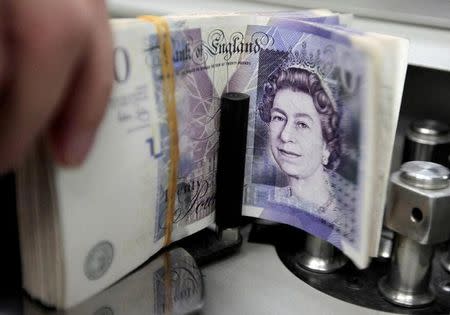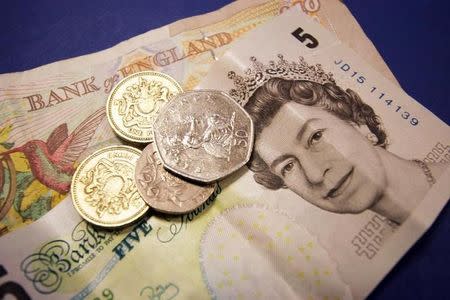British pound hits 11-week low on persistent hard Brexit uncertainty
By Jemima Kelly LONDON (Reuters) - Data suggesting the British economy kept its momentum at the end of 2016 was outweighed on Wednesday by uncertainty over whether Britain will undergo a "hard Brexit" from the EU, sending the currency to an 11-week low against the dollar. Industrial output rose 2.1 percent in November, recovering from a 1.1 percent drop in October and beating expectations for a 0.8 percent jump. But after initially inching higher on the data, the pound quickly gave up those gains as Brexit dominated. The pound briefly dipped below $1.21 for the first time since Oct. 25, before recovering to $1.2130, leaving it down 0.4 percent on the day. The pound posted its worst day in three months on Monday after Prime Minister Theresa May said she was not interested in keeping "bits" of its European Union membership. That sparked expectations Britain was heading for a hard Brexit, in which access to the single market plays second fiddle to immigration controls. Analysts said the impact of such an outcome remained the key driver for sterling on Wednesday. "Fresh shorts are being put on - this is kind of a repeat of what happened around the (ruling Conservative) party conference in October, with the market pricing in a harder Brexit," said UBS Wealth Management currency strategist Geoffrey Yu. "The data was pretty firm," he added. "Every indication says demand hasn’t really fallen yet in the UK, and for an economy that’s still largely domestic-demand driven that’s not a bad thing. So even though the Brexit narrative is clearly undermining the currency, the economic narrative is different." Yu said investors were not sure how to react to an article in the Guardian newspaper that reported government ministers had conceded they would lose a Supreme Court appeal to be able to formally trigger Brexit talks without parliamentary approval, as there was "no new information" in the story. Earlier, Britain's second-biggest supermarket, Sainsbury's, followed fellow supermarket chain Morrisons by reporting better-than-expected sales over Christmas. "Data on the whole is coming through pretty solid, but sterling cannot capture a rally," said Mizuho's head of hedge fund FX sales, Neil Jones. "Corporates and investors in the UK and overseas appear to be writing off good news on the basis that bad news lies ahead. If a market cannot go up on good news it must go down (and) today is no exception." Sterling has fallen around 19 percent against the dollar since Britons voted on June 23 to leave the EU, and around 12 percent against the euro, which has itself been vulnerable to political uncertainty. (Editing by Tom Heneghan)

 Yahoo News
Yahoo News 


